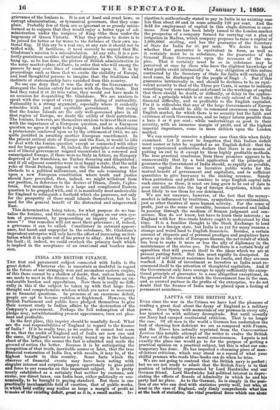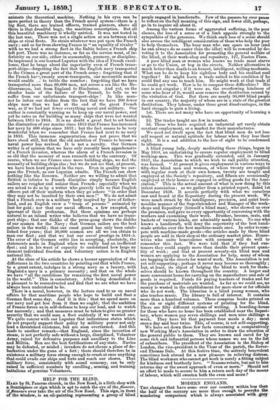LAPUTA ON THE BRITISH NAVY.
EVER since the war in the Crimea we have had the pleasure of reading a great deal about the decay of England as a military power. Even Spain, with memorials of our prowess in every city, has taunted us with military decrepitude. But until recently our Navy had escaped continental criticism. That is no longer the ease. Of all men in the world a German has undertaken the task of showing how deficient we are as compared with France, and the Times has actually reprinted from the Conversations Lexicon this notable attempt of the writer to evolve the British Navy out of the depths of his moral consciousness. Laput,a is not exactly the place one would go to for the purpose of getting a practical opinion on a practical subject, but this is what our con- temporary has done. He has imported a charming piece of man- of-letters criticism, which may stand as a record of what your skilful penman who reads blue-books can do when he tries.
We are not going to contend that the British navy is perfect ; but we are not ready to admit that the British Navy is in that position of inferiority represented by Lord Hardwicke and our German friend. Lord Hardwicke had political interest in depre- ciating the efforts of Boards of Admiralty in which he and his party had no place. As to the German, he is simply in the posi- tion of one who can deal with statistics pretty well, but who, at least in the case of England, only dimly comprehends what lies at the back of statistics, the vital practical force which can alone animate the theoretical machine. Nothing in his eyes can be more perfect in theory than the French naval system—there is a big fleet, there are trained officers, trained gunners, above all there is that dreadful bogy, the maritime conscription. But all this beautiful machinery is wholly untried. It was not tested in the last war. There was not a single action at sea between rival ships or rival fleets. No strain whatever was put upon the French navy ; and so far from showing France in " an equality of rivalry" with us we had a strong fleet in the Baltic before a French ship left port. There was no instance, so far as the service went, of in- feriority on our side, either in seamanship, gunnery, or discipline. So impressed is our learned Laputan with the idea of French excel- lence that he brags about the superiority even of French trans- port-ships—forgetting the fact that the English navy transported to the Crimea a great part of the French army; forgetting that if the French han3twenty screw-transports, our mercantile marine would enable- to treble the number; forgetting that we have transported more than 60,000 men, not across a sea like the Me- diterranean, but from England to Hindostan. And yet, on the slender basis of the failure of the Transit, he tells us we suffer from our unfortunate transport-ships ! In like man- ner he infers our decline from the fact that we have 200 fewer ships now than we had at the end of the great French war, as if we had not fewer everything naval and military. Our author is constantly warning us to keep up our naval power, and yet he rates us for building so many ships that were not wanted between 1815 to 1854. It is no doubt a great fact to set beside the diminution of our marine since 1815 that France has increased her navy by 400 ships since 1833 ; but the fact ceases to be very wonderful when we remember that France had next to no navy in 1833. This immense augmentation does not prove that we have stood still, but that the old ambition of France to become a naval power has revived. It is not a novelty. Our German writer is of opinion that we have only recently been apprehensive of a French invasion, whereas the alarm of a French invasion is so old that the memory of man runneth not to the contrary. Of coarse, when we see France once more building ships, we feel the necessity of building ships also ; but we do not see that, at present, we have been hard pressed in the race. Even in quality we sur- pass the French, as our Laputan admits. The French can show nothing like the Renown. Neither are we willing to admit that British is inferior to French discipline simply because English sailors are rougher and noisier than French ; especially when we are asked to do so by a writer who gravely tells us that English officers put off their uniform when they go ashore "in order that they may not be insulted by their own men !" We do not admit that a French crew is a military body inspired by love of father- land, and an English crew a `" troop of persons" animated by lust for gold ; nor that our naval officers, a few excepted, are ignorant of their professien. But these opinions are perhaps natural to an inland writer who believes that we have no trans- port ships ; that our dislike of the press-gang shows the dislike of our seamen for the Navy ; that German sailors are the best sailors in the world ; that our coast guard has only been estab- lished four years ; that 50,000 seamen are all we can obtain to man our fleet ; and that we lost our naval prestige in 1854-5. The error of the German critic lies in accepting, absolutely, the statements made in England when we really had an inefficient fleet ; and in his want of capacity to understand how large an element individual freedom and voluntary action is in English national life.
At the close of his article he shows a keener appreciation of the differences in the two countries by pointing out that while France, to a great extent, indulges in a strong navy as a luxury, with England a navy is a primary necessity ; and that on the whole we have "all the conditions for remaining the first naval power in the world." This is consolatory,. After being demolished it is pleasant to be reconstructed and end that we are what we have always been understood to be.
There is a moral, however, in the lecture read to us on naval affairs by that maritime people who hope to build and float a German fleet some day. And it is this : that we spend more on our navy and get less from it than we ought; that the ambition of France forces us in self-defence to keep our lead, and to watch her narrowly ; and that measures must be taken to give us greater security that we could man a fleet suddenly if we wanted one. We quite concur with our Laputan that industrious states which do not properly support their policy by military power not only lead a threatened existence, but are soon overturned. And this leads to another remark—that England, since the invention of steam, is not perfectly safe without a large, disciplined, Volunteer Army, raised for defensive purposes and auxiliary to the Line and. Militia. Men are the best fortifications of any state. Navies may be defeated, or misled ; invaders do not choose a place of de- barkation under the guns of a fort ; there should therefore be in existence a military force strong enough to crush at once anything that could evade our ships and forts and reach our shores. That military force, consistently with sound economy, can be only raised in sufficient numbers by enrolling, arming, and training battalions of genuine Volunteers.







































 Previous page
Previous page